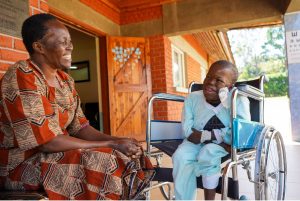Join a powerful, unprecedented alliance for better eye health for all.
Join IAPB-
Choose an alternate language here
Sarah, 25, from Bondo in Kenya’s Siaya county has a close bond with her mother Jane.
Without a wheelchair of her own, Sarah relies on her mother to carry her around the town.

“Most people, forget that we are all the same, when you stop a matatu (public vehicle) they often overcharge her since she occupies a bigger space and at times they rarely stop,” Jane said.
But recently Jane had another challenge to overcome.
“I realized a white thing developing in Sarah’s eyes and growing to be something else and I didn’t know what it was.
Jane carried Sarah into the clinic and the doctor advised her to visit Sabatia Eye Hospital. But once there the medical team diagnosed Sarah with anemia and transferred her to another hospital for a blood transfusion before she could be considered eligible for cataract surgery.
Jane felt overwhelmed and upset about Sarah’s condition.
“I take her to hospital regularly and she has been having physiotherapy for one and a half years.
“She liked watching TV, listening to music, and playing with others but now with these conditions, it is a problem because she can’t talk, hear, move, or see things clearly.
“When she wants something, she only makes sounds. At home she is taken care of by her siblings. When the siblings are not around, I engage someone else to look after her.
“I will be very happy and praise God when my daughter regains sight,” she said.
But thanks to the support of The Fred Hollows Foundation and the Australian Government through the Australian NGO Cooperation Program (ANCP), Sarah received the eye surgery she needed.
“I give thanks to The Fred Hollows Foundation for relieving me financially, emotionally and physically,” Jane said.
Image credit: The Fred Hollows Foundation